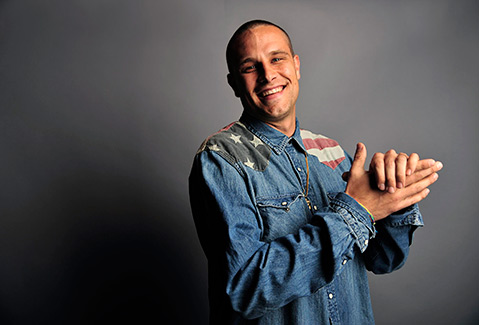Elliott Niezel Reflects on Hope in Upcoming Album
Rapper’s Hope Ranch Beach Record Speaks to Refuge and Positivity

ON THE BEACH: To some, Hope Ranch is home, to others an enclave; to born-and-raised Santa Barbara rapper Elliott Niezel, it truly is a place of hope. Niezel came to know the neighborhood as a refuge during tough times in his early life. On his newest LP, Hope Ranch Beach, he pays tribute to the good times had there and to his escape from inner demons. In his words, it’s street music with a mellow beach undertone. This October, Niezel will be playing at the A3C Festival & Conference in Atlanta, sharing a playbill with artists like De La Soul, Rakim, Cam’ron, Curren$y, and many others. I spoke with him in an email interview about early struggles, thinking positively, and Hope Ranch.
Tell me a bit about your difficult early years in Santa Barbara. What was that experience like? My early years growing up in Santa Barbara weren’t easy, but by no means did I have it as bad as some of my close friends. My parents divorced when I was 6, at which time the whole two-homes, two-separate-parents-sharing-kids thing begun. I moved around a lot with my pops and would see my mom on the weekends. Things were difficult during those times. I had a lot of issues with things I didn’t understand or couldn’t process. To hide my true feelings and deal with what was my reality, I turned to drugs and alcohol. Drugs took priority over shelter, food, clothing, and fun. I slept in playgrounds, at parks, in the tubes with no blankets, and on the concrete. To this day, my memories hold on tight to the loneliness of walking the cold streets at night, with no one.
In an article in Rude Boy magazine, you say you once were addicted to negativity but now you’re hooked on positivity, and that you’ve put your past behind you. What initiated the positive change? Positivity is a fairly new concept to me, one that I still struggle to uphold on a daily basis. I’ve always fed off negative situations and negative people. Today I am a huge believer in the belief that you get what you put into the world. With my fair share of “close to death” experiences, if I hadn’t made the choice to change, I probably would have died.
I started having thoughts of changing and becoming better for myself when I met my fiancée, Claire. She saw the good in me, the person I was capable of being, and she also wouldn’t allow me to hang out with her under the influence. I partially owe the change to her, and my family — but I am the one who put in the work, a lot of hard work. Living a life of positivity takes work, but it’s so worth it.
You write beautifully about how Hope Ranch represents a place of hope to you. Do you ever feel a disconnect in terms of the Santa Barbara lifestyle and the struggles of your own upbringing? Hope Ranch is a trip. I decided to do the Hope Ranch EP and LP series because I have so many memories inside those gates. Sometimes I did feel a disconnect between my family life and the life of those residing in Hope Ranch. But at the same time, it helped me grow as a person and see different perspectives and different lifestyles. I grew up in low-income apartments and had very little money, but at the same time I had friends on the other end of the spectrum growing up wealthy in Montecito and Hope Ranch. I was able to accept people based on their character, not their status.
What does your future hold for you, either musically/professionally or otherwise? The future is bright. I look forward to touring soon and whatever life has in store for me!



